Social Commerce Advancements that Sell

The ability to complete an order within the very apps that consumers are already using to browse and save products is a recipe for success, but it's an idea that just hasn't taken off quite yet.
Currently, only 10 percent of people have used social buy buttons on popular platforms like Facebook and Pinterest despite most (73 percent) being familiar with them, according to 2016 data from SUMOHeavy. Some experts, however, believe social commerce's long-awaited hey day is coming - and soon.
Elana Anderson, senior vice president of worldwide marketing for commerce cloud at Demandware, a Salesforce company, says that while social only represents a tiny percentage of commerce, it is growing at a much faster rate than mobile was at the same age and maturity. Anderson predicts when Google fully launches its purchase capabilities that the industry will start to see huge adoption of social commerce because Google has such broader access to consumers.
Google's Shop the Look
For the unfamiliar, Google recently announced a "Shop the Look" offering, which allows searchers to buy products directly from the search engine result pages (SERPs), which is similar to how Knowledge Graph gives users answers to their questions without leaving the SERPs as well.
While Shop the Look isn't social commerce as we have come to know it (e.g., Facebook shops, Buyable Pins, etc.), Shop the Look pulls images of popular fashion bloggers wearing outfits that match the criteria of a person's search query - presenting a person searching for "cocktail attire," for instance, with images of influencers wearing suggested items. Google users can then shop the look by tapping on the select items being advertised (see below).
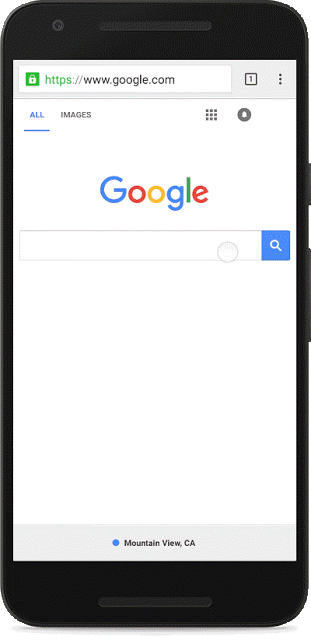
Shop the Look is currently being tested in the U.S. on mobile devices. Google states that retailers interested in showing their products within the shop-the-look experience need to create a Shopping campaign and ensure bids are optimized to show on mobile.
When it comes to social commerce, mobile is the end all, be all. Being able to present potential buyers products and experiences that are optimized for their device and within their preferred channel (where they spend most of their day) is retail gold if merchants can leverage the right opportunities. Shop the Look is one new social commerce offering that may actually work, and Instagram's direct-response campaigns is another.
Direct-Response Ads from Instagram
It's been roughly a year since Instagram announced new ad formats with calls-to-action (CTAs) like shop now, install now, learn more and sign up, but end-users may have noticed more of these ads in their feeds than ever before. For one, Instagram introduced an algorithm this year that prioritized certain posts over others and, secondly, Instagram has doubled its number of advertisers in six months.
There are a few likely reasons for the growth including (1) the ability to create Business Pages, (2) the decrease in organic reach Business Pages have experienced both on Instagram and its parent company Facebook, (3) the worry from some advertisers about the "native" formats they have used in the past that is catching the eye of the FTC, most notably sponsored celebrity posts like the one shown below and (4) the previously mentioned new ad formats have received some enhancements, which may increase conversions.
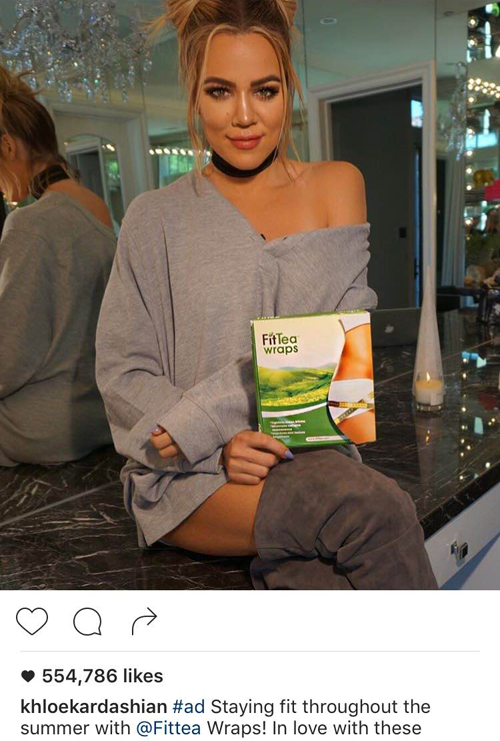
Last week, Instagram announced four new solutions (rolling out over the next month), which guide users to take action in a few different ways.
The CTA (first image) will be highlighted (second image) when people show interest on or around an ad, like resting on the ad for four seconds or tapping on the profile name.
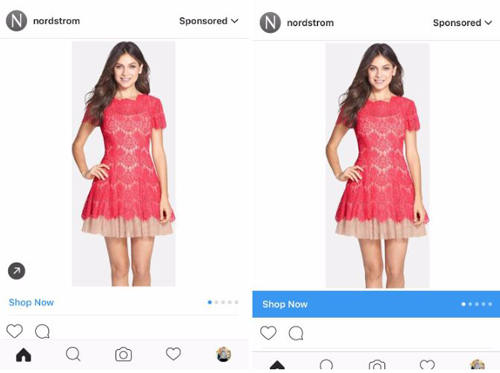
When Instagrammers tap into an advertiser's profile from an ad, a CTA currently appears at the bottom of the profile (see image). In addition to adding the button to the advertiser's profile which was implemented in June, the button will now extend to the comments section.
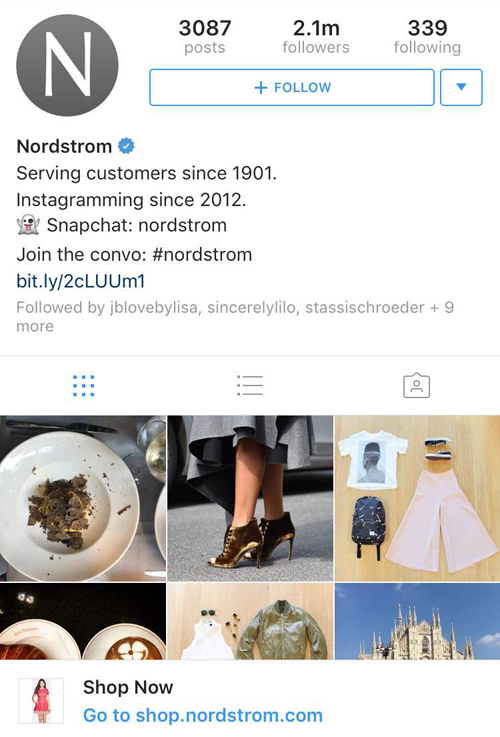
When Instagram detects additional information from an ad like price, destination URL or app store rating, it will automatically add it to the CTA.
For video link ads, when people unmute a video they'll be taken to the destination URL while the video continues to play at the top of the screen. People can also go to full screen or dismiss the video player if they prefer to browse the Web page.
Buyable Pins, Shopping Bag from Pinterest
With Google's "shop the look" offering as well as Instagram's ad updates and increase in advertisers, social commerce is clearly evolving. Both Google and Instagram, however, have Pinterest to thank for its immense role in presenting the idea to consumers that they could use the Web to save products/projects, get inspiration and ultimately buy an item on Pinterest - without leaving.
Buyable Pins within the Pinterest app went live last year, and Buyable Pins for the Web are finally here (on select ecommerce platforms: Bigcommerce, Demandware, Magento and Shopify). The cross-channel Buyable Pins speak more to consumers' actual behavior, hopping from device to device.
Pinterest's new Shopping Bag will also remember the items that people are interested in whether they are in the app or on the Web.
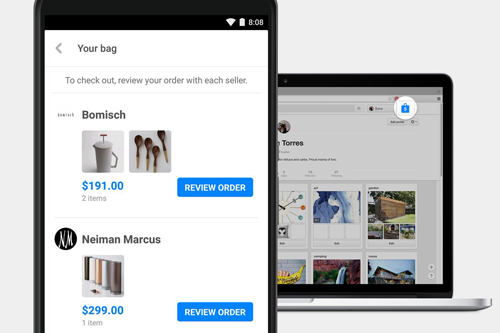
Digital Wallets, In-App and Everywhere
Social commerce opportunities are there, and consumers will likely soon take advantage of them more not only because they will get used to the idea of buying within an app but alternative payment methods will make it much easier to do so.
Apple Pay, for instance, is integrated within the Pinterest app and will hit the Web before the holiday season starts. When retailers add the ability to pay with a digital wallet, consumers experience less friction in the mobile checkout experience, which is notorious for being clunky at best.
Even without Apple Pay, the checkout experience Pinterest provides for mobile devices is superior in terms of ease-of-use to what many retailers offer on the mobile Web (see image).
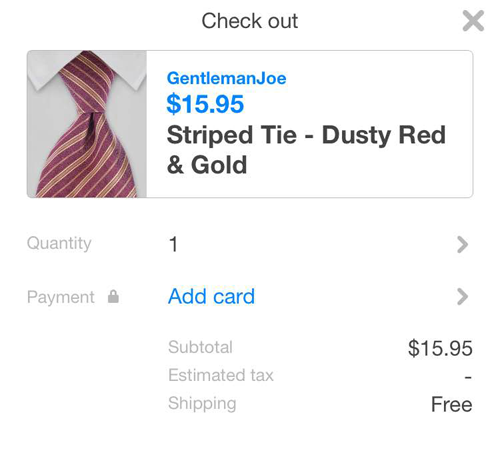
Retailers should, of course, change that by implementing features that take advantage of mobile's capabilities like an expanded keypad for entering in numerical details, location information to personalize experiences and offers, deep linking, large calls-to-action or "swiping" to view a picture gallery.
Your Own Customers
Alongside ads, mobile functions and more, brands won't want to forget the basics of social commerce and that's user-generated content (UGC).
As the most influential form of content, brands will want to continue encouraging customers to share their experiences within Facebook, Instagram and other networks in order to reach audiences they may not have been able to on their own. Retailers will want to consider including a branded hashtag (Alex & Ani uses #CharmedArms, for example) on marketing material and within their own social posts as well as acknowledging the role that packaging plays in social shares. By ditching the traditional brown box and presenting a more gift-like package (whether it's through a branded box, stickers, tissue paper, etc.), retailers are likely to increase their social shares and start competing with subscription services like LeTote, Birchbox and Stitch Fix, which all enjoy very active audiences sharing their monthly boxes on social.
A Very Social Holiday Season
With UGC, social commerce advancements and the expected increase in use of digital wallets, it's the perfect digital environment for this holiday season to be the best yet for actual results from the networks and retailers encouraging shoppers to research and buy within the apps they are already spending most of their time. It's up to retailers, of course, to include the most compelling CTAs, product images and product descriptions to get consumers clicking and buying.

Subscribe to Our Newsletter!
Latest in Social Media










